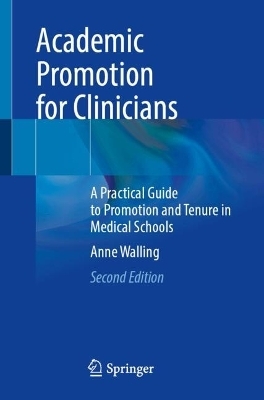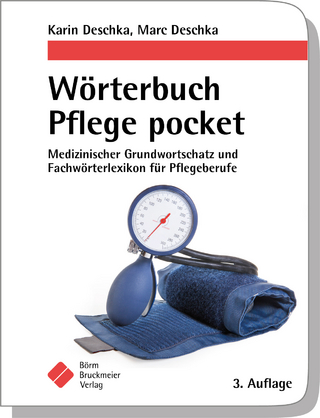
Academic Promotion for Clinicians
Springer International Publishing (Verlag)
978-3-031-84035-7 (ISBN)
- Noch nicht erschienen - erscheint am 07.04.2025
- Versandkostenfrei innerhalb Deutschlands
- Auch auf Rechnung
- Verfügbarkeit in der Filiale vor Ort prüfen
- Artikel merken
This book is a practical guide to the appointment, promotion, and tenure (APT) process for clinical faculty members of medical schools. It provides insights and recommendations on career planning and academic promotion for clinical faculty members. It also addresses much of the "mythology" surrounding the APT process and demonstrates how academic promotion should be approached as a career-building process rather than a daunting high-risk event. Topics discussed in the first edition include concepts and processes within academic promotion; navigating the academic promotion and tenure process; and managing the outcome of the APT application. Academic Promotion for Clinicians is a valuable resource for clinical medicine faculty members as they engage in and successfully address the challenges of the APT process to realize their career goals.
The biggest change for the new edition is the incorporation of the growing literature and many recent developments regarding career development and promotion for non-tenure track faculty including new chapters addressing the specific concerns of the largest groups, clinician-educators and those heavily involved in research or patient care. Since the previous edition, the faculty of US medical schools has grown by 25% to over 200,000 individuals, 75% of whom are physicians. Only 21% of faculty members have achieved professorial rank. This book aims to encourage interest in academic promotion and provide practical assistance to the 96,000 assistant professors and 42,000 associate professors in US medical schools. Women and members of groups historically underrepresented in medicine (URM) face unique issues in navigating academic promotion systems. These issues have received greater attention from institutions and in the literature since the first edition. The revision includes a summary of national and institutional efforts to make academic careers and promotion more desirable and feasible for women and faculty members from URM and other disadvantaged backgrounds, including discussion of outcomes and future directions for such programs.
The sections on faculty perceptions and attitudes towards promotion have also been heavily revised to include consideration of the influence of important events and trends since the previous edition such as the COVID pandemic, transition of the last cohort of baby boomers into retirement age groups, and developments in literature on professional identity and career motivation. The update also addresses the influence of the growing "feminization of medicine" on academic careers. Since 2013, the number of female faculty members has risen from 61,000 (38% of total) to 85,000 (44%). Currently, 59% of instructors, 48% of assistant professors, and 41% of associate professors are women. The accelerating "flight from tenure" in clinical departments is also addressed. Updated data and graphs demonstrate the dramatic changes in tenure-related appointments of clinicians and the substantial differences across specialties. In 2023 only 19% of fulltime clinical faculty hold tenure-related appointments but this ranged from around 11% in family medicine to over 33% in public health and preventive medicine. The new edition expands the discussion of the implications of these trends on expectations for career development, and on the criteria and systems for academic promotion for clinicians.
Finally, the book provides updated information on external and internal changes in the medical school environment that impact faculty careers and academic promotion. These include significant revision of the process and requirements for LCME accreditation; the demands and consequence of the "medical education revolution" and widespread curricular reforms; growing significance of team science, translational, applied and other non-traditional research; financial and other pressures on academic health centers; the continuing blurring of the distinctions between ac
Anne Walling, MB, ChB
Professor Emerita
University of Kansas School of Medicine
Wichita, KS, USA
The Academic Promotion Process A Users Guide.- Why Is Academic Promotion So Challenging for Clinicians.- Titles Tracks and Terminology.- What Counts for Academic Promotion.- How the System for Academic Promotion Works.- The Participants in the Academic Promotion Process Roles and Responsibilities.- Applying for Academic Promotion Why When What.- Strategies for Success The Long Game.- Strategies for Success Preparing for the Application.- Practical Approaches and Pearls to Complete a Successful Application.- After the Decision Outcomes Reflection and Next Steps.- Clinicians on Tenure Tracks.- Clinicians heavily involved in education Clinician educators and similar tracks.- Clinicians heavily involved in research Clinician scientist Clinician investigators and similar tracks.- Clinicians focused on clinical service.- Special Groups of Faculty members of groups underrepresented in medicine clinicians with nonfulltime appointments regional campus faculty non physicians clinicians in nonclinical departments graduates of non US institutions female faculty members.- Summary of the History of Tenure at United States Universities and Medical Schools.- National Organizations for Medical School Faculty members.
| Erscheint lt. Verlag | 7.4.2025 |
|---|---|
| Zusatzinfo | X, 190 p. 10 illus. in color. |
| Verlagsort | Cham |
| Sprache | englisch |
| Maße | 155 x 235 mm |
| Themenwelt | Medizin / Pharmazie ► Allgemeines / Lexika |
| Medizin / Pharmazie ► Medizinische Fachgebiete | |
| Sozialwissenschaften ► Pädagogik | |
| Schlagworte | academic promotion • appointment, promotion, and tenure process • APT • APT application • Career Planning • institutional APT policy and guidelines |
| ISBN-10 | 3-031-84035-6 / 3031840356 |
| ISBN-13 | 978-3-031-84035-7 / 9783031840357 |
| Zustand | Neuware |
| Informationen gemäß Produktsicherheitsverordnung (GPSR) | |
| Haben Sie eine Frage zum Produkt? |
aus dem Bereich


